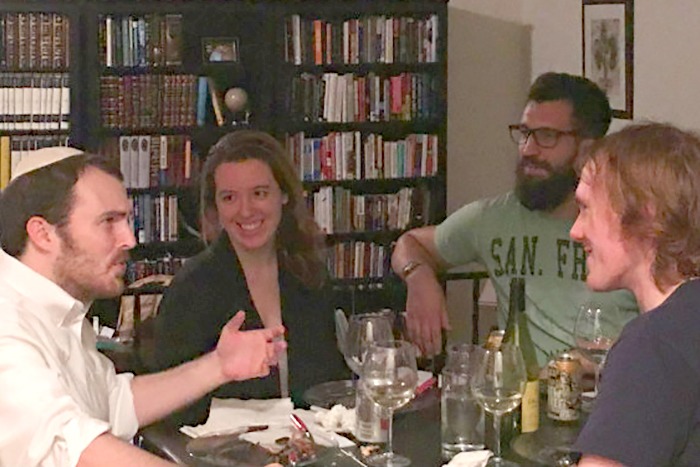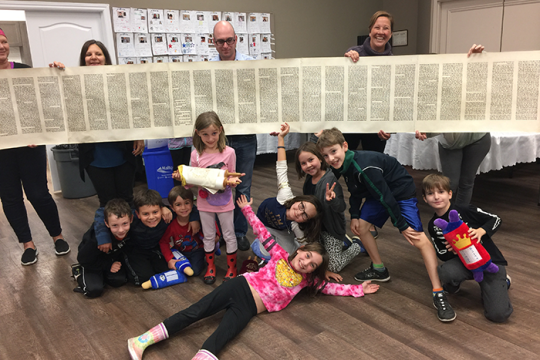
When Derek Black was 11, he designed the kids’ page for the first major Internet hate site, Stormfront, which his father created and still leads. After Derek was outed in his freshman year at New College in Florida as a white nationalist, one of the few Orthodox Jews on campus, Matthew Stevenson, invited him to Shabbat dinner in his dorm room.
Krista Tippett, host: Why did you reach out to Derek?
Matthew Stevenson: When the news broke that Derek was a white supremacist, many people on campus treated him very poorly, trying to make his life miserable. I knew that Derek had grown up amongst white nationalist royalty, so to speak, and probably didn’t know any people from the backgrounds his ideology despised. So, I invited him to one of the Shabbat dinners I had been hosting in my dorm room every Friday night.
I felt that my visible Jewish identity provided a unique opportunity to extend a hand to Derek in a way that a Catholic student, for instance, might not have been able to do without suspicion. Even my critics didn’t think I was a white nationalist.
Krista: When you were growing up, Derek, would you have described Stormfront as a racist hate site?
Derek Black: We would never use “racist,” because that means “bad person,” and we’re not “bad people.” We don’t hate or dislike; we’re just interested in preserving our own. Very little mental space was actually spent on worrying if what we were advocating had a negative impact on anyone else.
Krista: When did that perspective begin to change for you?
Derek: One of the people I got to know at Matthew’s Shabbat dinners agreed to come to a seminar I organized. When I asked her what she thought about the event, she said, “Why are all these people here so focused on denying the Holocaust? Why are these people so focused on a Jewish conspiracy in America? What does that have to do with loving your own? That’s hate.” And I didn’t have a good answer.
Krista: You’ve said that quiet civil dialogue was not enough to change your white supremacist ideology. What did it take?
Derek: It is not true that the only way to change people’s minds is by having friendly conversations with them. At college, the community of people I had gotten to know and respect for a semester, before they knew who I was, stood up and loudly condemned what I was advocating as morally and factually wrong. The quiet conversations couldn’t have happened without that outrage.
Matthew: Though white nationalism is reprehensible to us, once you cross the line to saying, “He’s forfeited his rights as a human being; he’s forfeited his right to human dignity by virtue of having those beliefs, where does it end? The Nazis said that the Jews forfeited their rights to human dignity by virtue of being Jews.
It's one thing to say that people could change, but it’s another to see somebody who had been engaged in enormously destructive behaviors not only cease doing those behaviors, but to do a complete about-face and help other people in the same situation they had been in and try to make the world a better place. Derek’s example has convinced me that no matter how deeply involved somebody is in a negative pattern of behavior or mired in a negative ideology, they’re never in too deep. There is always a chance for redemption.
Derek: I learned from my experience at New College that I had opposed inclusion and advocated separation because I didn’t empathize with people who weren’t part of my in-group. What changed was feeling that people who were not in my in-group were being negatively impacted by my actions, and that I should care about that.
Matthew: Associating with people who share the same worldview and opinions you have may be psychologically pleasing, but you risk losing empathy for those who disagree with you. I am hopeful that the underlying spark of goodness, this empathy that’s within each and every one of us, will win out in the long run.
Derek: If we are willing to spend the painful time it takes to change and challenge our beliefs, I think we can create enormous change and enormous correction in the way things are and the way things work. And that’s encouraging.
This interview was adapted with permission from On Being with Krista Tippet, an independent non-profit public life and media initiative, and taped live at the United States Holocaust Memorial Museum in Washington, D.C. Matthew Stevenson is currently pursuing an MBA at Columbia Business School, and Derek Black is pursuing graduate work in medieval history at the University of Chicago.



